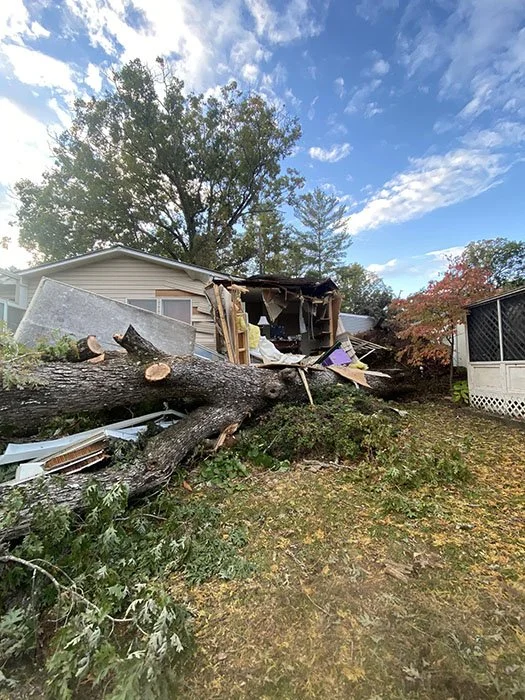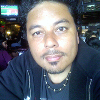Helene, a Name I Refuse to Forget
/Helene's wrath in North Carolina (Photo by Tony Robles)
We collectively thought that while destructive hurricanes hit the coast—known as the Outer Banks—their remnants dispersed and dissipated towards the mountainous west, bringing havoc but much less severe. We’d received alerts from the National Weather Service warning of major flooding—life threatening flooding—upon the arrival of Helene. We were not told to evacuate. The hurricane hit our area on Thursday. I woke at 4:30 a.m. to the sound of howling wind and trees and branches shaking and snapping. Thirty minutes later I heard a scream. I looked out my window. A large tree had been uprooted and had fallen on a nearby unit in our mobile home park. I watched from my bedroom.
I thought about my mother in the mountains in Bat Cave, a short distance from Lake Lure and Chimney Rock, severely damaged places now burned into memory. In the case of Chimney Rock, a quaint tourist town, it’s total destruction. Same fate for Lake Lure, known as the location for the movie Dirty Dancing. Both places are of short distance from one another, with my mother in the mountain in nearby Bat Cave.
(Photo by Tony Robles)
We had no power, no cell service; no internet, conveniences I realized I took for granted. Markets were thankfully open but only accepted cash. I got a call from my mother in spite of the spotty cell phone service. She said she was being airlifted from her home in the mountain. Her house wasn’t damaged, she said, but everything else was—roads, bridges—all points of entrance and exit swept away in the torrent. My mom bid me goodbye. I could hear the helicopter over the phone. She and my stepfather were flown to North Hendersonville High School and from there driven to my stepfather’s brother’s house. I reunited with them later in the evening.
Days went by, ten without power, several without water. My mobile home community, Summerpath Village, rallied together. One resident had a generator. The property had a clubhouse where we gathered and talked and strategized on how to get by without electricity, what food was available, how to get water and other essentials. The clubhouse was a hub. Some had lost their homes, including a woman in her 80s who had significant health problems. Fortunately, she was pulled from her home, unharmed but shaken; a large tree had fallen on her unit and crushing it.
When’s the power coming back, we all asked? We’d heard it would be a week, then more than a week. Water had been restored, but we were advised to boil it due to the damage done to water treatment facilities and possible damage to pipes. But we couldn’t boil it because we didn’t have electricity. Our mobile home community’s residents were in disbelief that it had hit our area. Some had experienced hurricanes, one resident had lived through three of them in Florida.
In the weeks prior to Helene, we’d had heavy rainfall. The ground had been saturated by rainfall. The energy caused by a warm front, wind, and rain was sustained and did not dissipate. This caused mudslides that devastated mountainous regions, valleys, and hollows (known across Appalachia as “hollers.”). Homes were swept away in places like Swannanoa, an area with many trailer homes and was completely destroyed. Other areas like Boone, Nebo, Waynesville, and Bakersville sustained extreme damage.
The hurricane hit our area on Thursday. I woke at 4:30 a.m. to the sound of howling wind and trees and branches shaking and snapping. Thirty minutes later I heard a scream.
In the aftermath of Helene, we waited for power to be restored. It was restored yesterday, a little after 10 a.m. As the electricity came back the clicks and knocks and pings of devices came out of hibernation. It seemed that a sense of normalcy was quickly reclaiming what had been taken away days prior. It seemed that normalcy was sneaking in too quickly. I write this by candlelight. I have not turned on the lights in my mobile home unit. I don’t want to forget what happened here. I don’t want to take the light for granted. I don’t want to forget what was taken from us temporarily by Helene. Many others lost far more than we did. We must remember.
Helene
I don’t want to forget how you
Shook the trees, shook me awake
At 4:30 a.m.
I don’t want to forget being
Stripped of power
But in coming together
Realizing we have power
I don’t want to forget
Manang Francisca in the Supermarket,
The only Filipino face I saw, walking
Aimlessly with a gallon of milk in one
Hand and a loaf of bread in the other
Manang! Manang! I cried out.
Stand in line with me.
The line was longer than the
Longest snake, looping around the
Circumference of the store with people
Who were told that the store was only
Accepting cash after standing in line for
15 min….30 min
Manang Francisca and I waited
In line together for more than an
Hour but it seemed like a lifetime
As she told me that her grandma had
Lived through the war with the Spanish
I don’t want to forget groping in the dark,
My fingers touching the faces of my
Neighbors whose faces I finally saw in
The darkness, a darkness so clear as my
Fingers felt every dip and curve and contour
Of their faces
I don’t want to forget the neighbor
Who argued with his Chihuahua, Norman,
Every morning, bickering, saying: Damn
It, Norman! I don’t have time for your
Bullshit!
I don’t want to forget the fallen
Trees and the roots exposed
To both darkness and light
I don’t want to forget my
Neighbors like Jorge Luis Vasquez Colon
Who helped clear away the snapped limbs
Of trees with his own limbs tattooed with
Images of his Taino ancestors.
Boricua! Boricua!
I don’t want to forget
Manong Gio in Edneyville who
Had no power, no water
I don’t want to forget
Bringing him a canister of water
Tubig! He cried out
I don’t want to forget the dark
Because it is in the darkness that
Drank every bit of precious light
I don’t want to forget my
Mother telling me to hunker down
And the pounding sound
Of wind and rain
As all fades to black
I don’t want to
Forget what happened here
As I write this
In the light of a candle
The day after the power
Came back
© 2024 Tony Robles
To help the author's family: https://gofund.me/e01d666c
Tony Robles, "The People's poet" is author of two poetry/ short story collections: Cool Don't Live Here No More-- A letter to San Francisco" and "Fingerprints of a Hunger strike ". Short list nominee for poet laureate of San Francisco in 2017 and 2019 individual artist grant recipient by the San Francisco Art Commission. Currently lives in North Carolina and is working on his first novel.
More articles from Tony Robles





